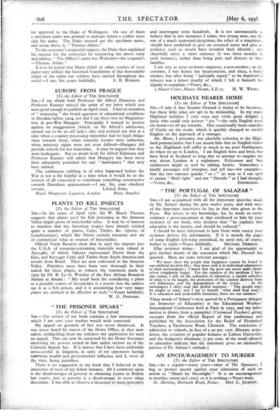"THE PORTUGAL OF SALAZAR '
[To the Editor of THE SPECTATOR] • am acquainted with all the important speeches made by Dr. Salazar during the past twelve years, and with most of the important interviews he has in that time given to the Press. But never, to my knowledge, has he made so extra- ordinary a pronouncement as that attributed to him by your reviewer of my book, who declares that "he explains that education is the enemy, and should be -reduced."
I should be most interested to hear from what source your reviewer derives his information. If it is merely the pages of some English left-wing periodical, he need not; of course,
bother-to reply.—Yours faithfully, MICHAEL DERRICK.
[Our reviewer writes I am glad of the opportunity to give further details of the statement which Mr. Derrick has queried.. Here are some relevant passages : "We must show the people that happiness cannot be found in our artificial modem life ; they must seek it in individual adaptations to their environment -I know that the poor can never make them- selves completely happy. For the. solution of the problem I have just stated, I rely on the reduction of education, a careful selection of what is to be taught, the protection of the country districts from evil influences and the depopulation of the towns. . . . In the newspapers I Often read this pitiful sentence : The people most be taught to read,' and I say to myself, 'what shall they read ?'. It is education and undesirable literature, these are our enemies." These words of Salawit's were quoted by a Portuguese delegate (an Inspector of Education) at the Educational Workers' International Conference held at Paris in 1935, and my infor- minion is drawn from a pamphlet (Victimised Teachers) giving excerpts from the official Report of that conference and published by the Association for the Relief of Victimised Teachers, 9 Eastbourne Road, Chiswick. The restriction of admission to schools, in face Of a so per cent. illiterate popu- lation, the cessation of popular lectures at Lisbon University, and the budgetary allotment (5 per .cent. of the total)illowei1. to education indicate that the statement gives no misleading picture of Dr. Salazar's attitude.]


































































 Previous page
Previous page